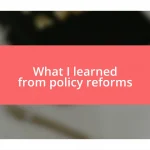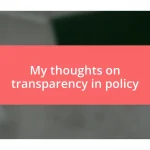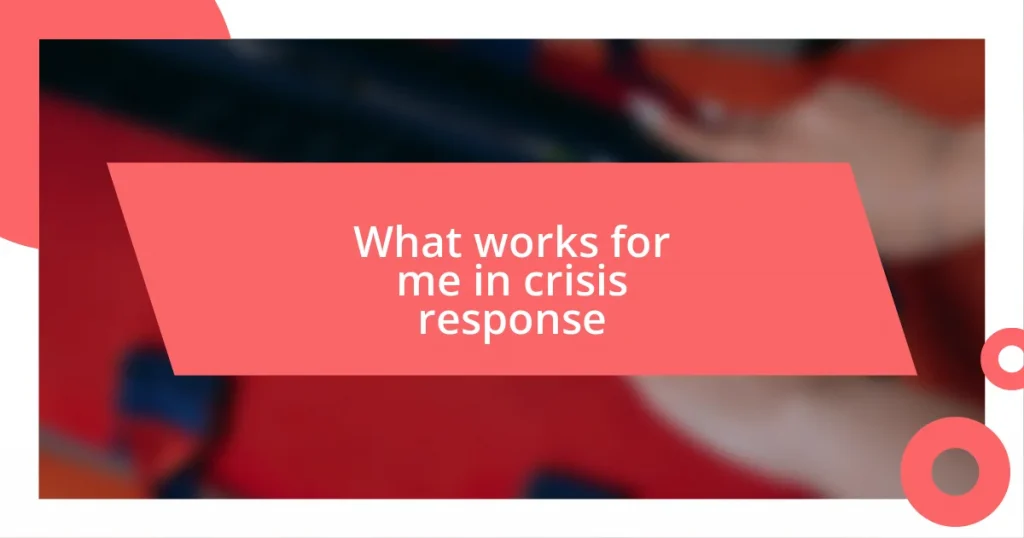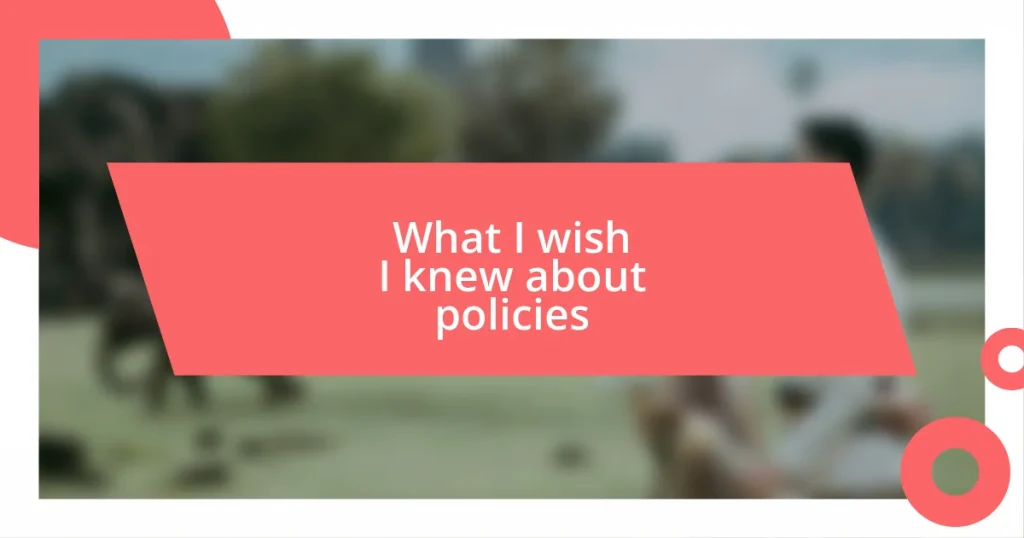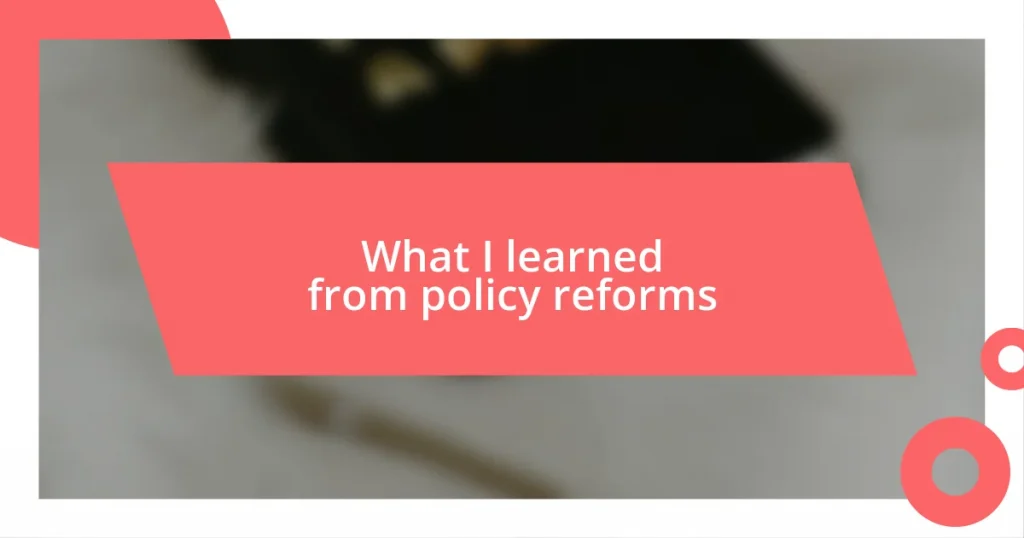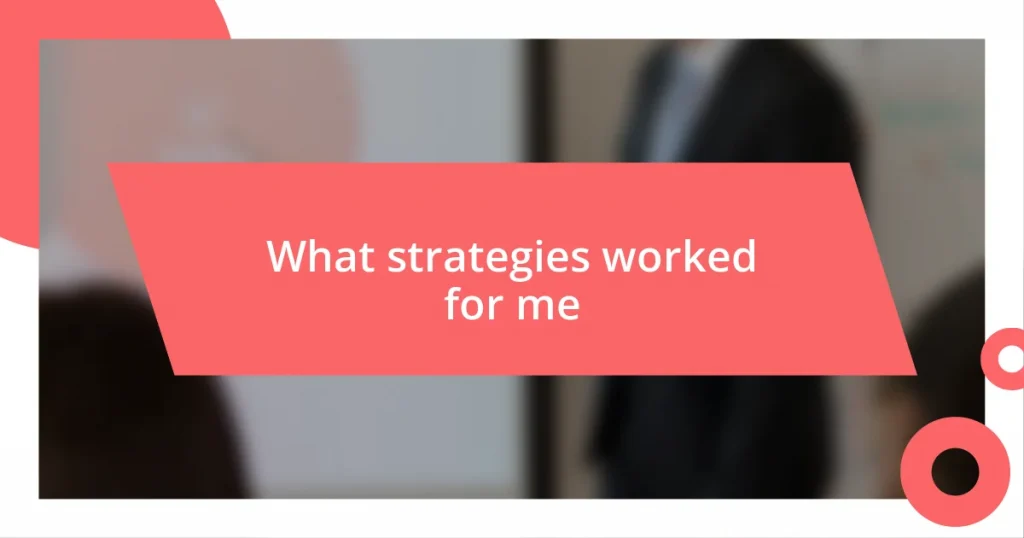Key takeaways:
- Effective crisis response relies on clear communication, calmness, and reflective listening to diffuse tensions and foster problem-solving.
- Identifying personal crisis triggers and discussing them with your team can lead to better emotional management and a more supportive environment.
- Building a proactive response plan, maintaining a support network, and regularly evaluating and adapting strategies are crucial for effective crisis management.
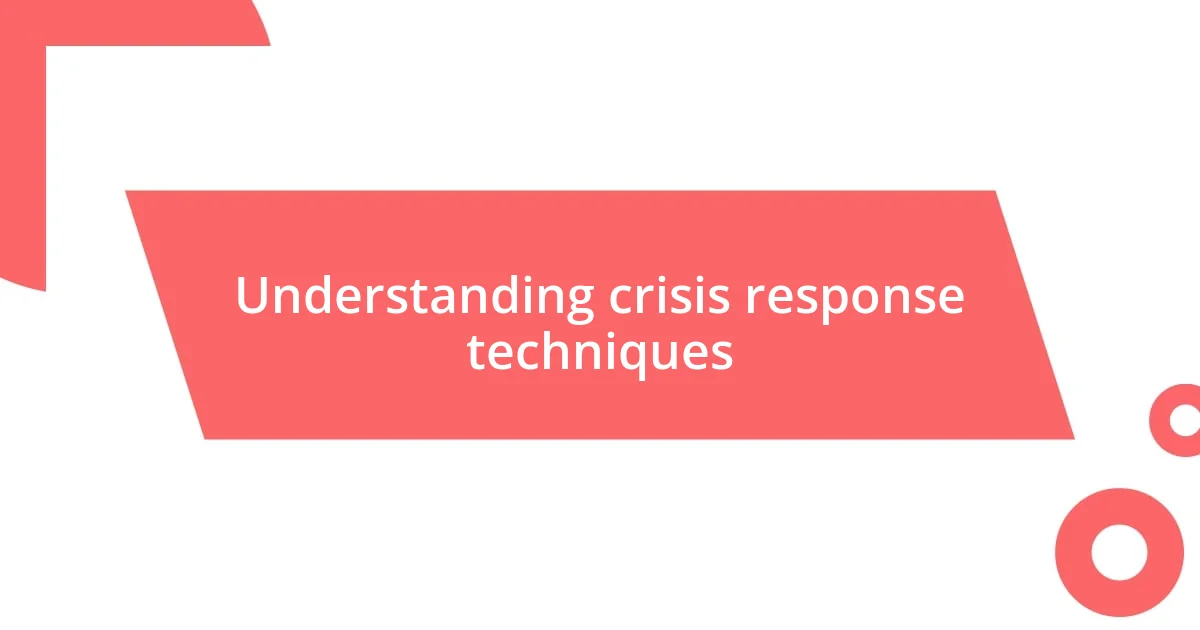
Understanding crisis response techniques
Crisis response techniques can vary widely, but at their core, they revolve around clear communication and swift action. I remember a time when a sudden team conflict arose that threatened our project timeline. It was eye-opening to see how addressing the issue head-on, rather than letting it fester, not only resolved the conflict but also strengthened our team’s bond.
One technique I often reflect on is the importance of remaining calm and composed during a crisis. It’s fascinating how a measured response can radiate a sense of security. Have you ever noticed how the energy in a room shifts when someone takes charge calmly? I once faced an abrupt deadline change, and maintaining my cool allowed my team to focus on solutions rather than spiraling into panic.
Another crucial method is the practice of reflective listening. This technique not only validates the emotions of those involved but also opens the door to effective problem-solving. I can’t count how many times I’ve helped colleagues feel heard simply by giving them the space to express their concerns during tense situations. Isn’t it amazing how sometimes just letting someone vent can diffuse the tension and lead to a more productive discussion?
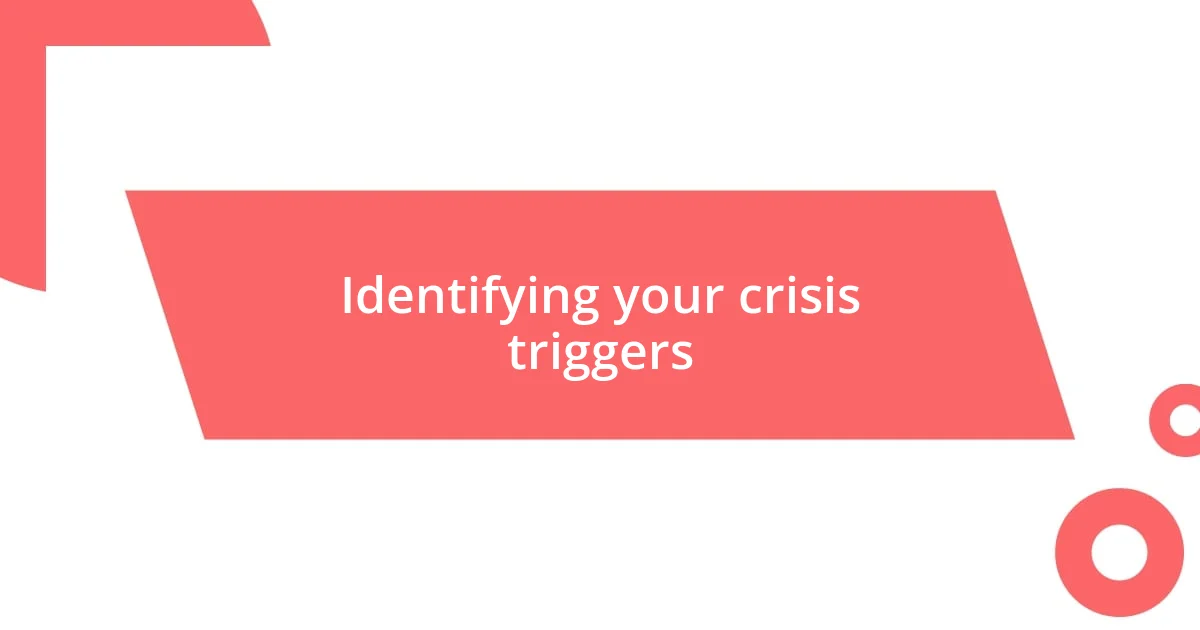
Identifying your crisis triggers
Identifying your crisis triggers is a deeply introspective process that can uncover a lot about ourselves. For instance, when I realized that sudden changes in plans triggered my stress response, it provided a pathway to better manage these feelings. I started journaling about my emotional reactions, which not only helped pinpoint those triggers but also allowed me to develop coping strategies.
During a particularly hectic week at work, I discovered that lack of communication from my team was a significant stressor for me. Instead of dismissing this feeling, I took the time to express my need for regular updates. Have you ever noticed how openly discussing feelings can alleviate the weight of hidden worries? By sharing my triggers, a sense of relief took over, thus fostering a healthier team atmosphere where we could all thrive.
The journey of identifying our triggers can be incredibly enlightening. It’s almost like peeling back layers of an onion; each layer reveals hidden sensitivities and responses I’ve had over time. Reflecting on past crises, I could correlate situations that sparked anxiety with specific triggers, like tight deadlines or ambiguity in tasks. By mapping these out, I felt empowered to take proactive steps in managing my reactions, ultimately leading to a more resilient approach.
| Trigger Type | Response |
|---|---|
| Communication lapses | High stress, concerns about project progress |
| Unexpected changes | Anxiety and uncertainty |
| Time pressure | Panic leading to impulsive decisions |
| Conflicts in team dynamics | Emotional distress, withdrawal from discussions |
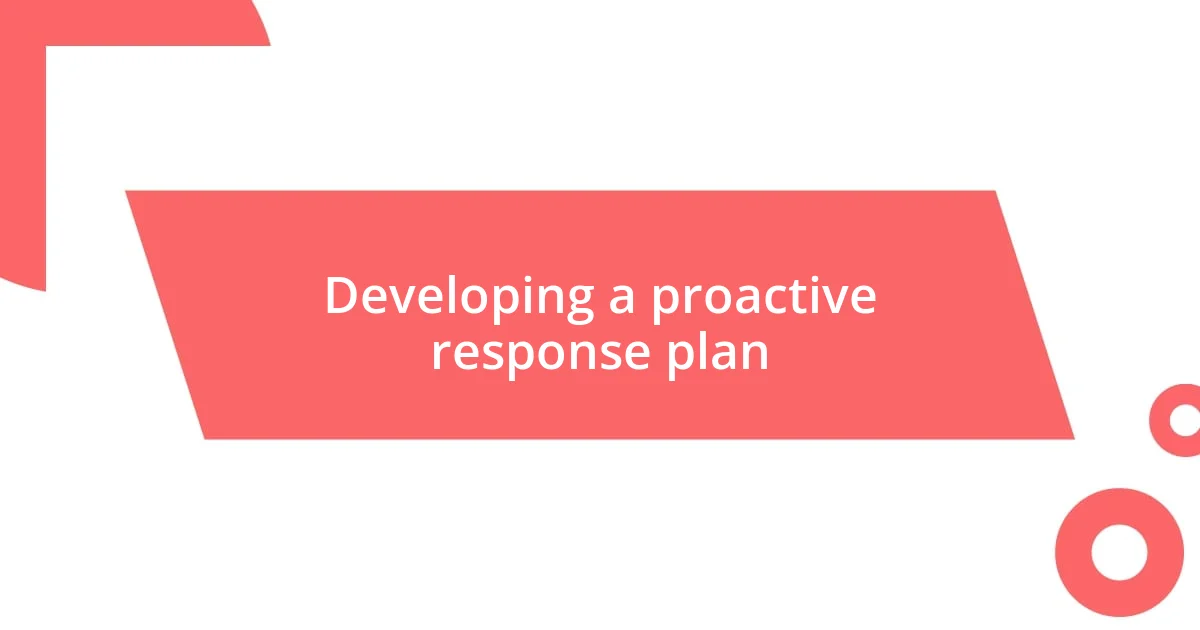
Developing a proactive response plan
Creating a proactive response plan is essential for navigating crises effectively. I often think about how laying the groundwork beforehand can provide clarity in chaotic situations. For instance, during a major project launch, I took the initiative to outline potential crises we might face. This approach not only made our team feel more prepared but also fostered a sense of unity, as we all contributed ideas and identified strategies together.
Here are some key elements to consider when developing your proactive response plan:
- Define potential crises: Brainstorm scenarios that could disrupt operations.
- Establish clear communication channels: Determine how information flows during a crisis.
- Assign specific roles: Identify team members responsible for various aspects of the response.
- Create contingency plans: Outline actions for each scenario to guide your team effectively.
- Regularly update and practice the plan: Schedule drills or simulations to enhance familiarity with the plan.
I vividly remember a time when we faced an unexpected technical failure on our website. With our plan in place, I quickly gathered the team and we went through our assigned roles with remarkable efficiency. This made the experience not only manageable but also showed me how a solid plan can alleviate the panicky urgency of a crisis. I find that when everyone knows their job and feels confident, it transforms the atmosphere from frantic to focused.
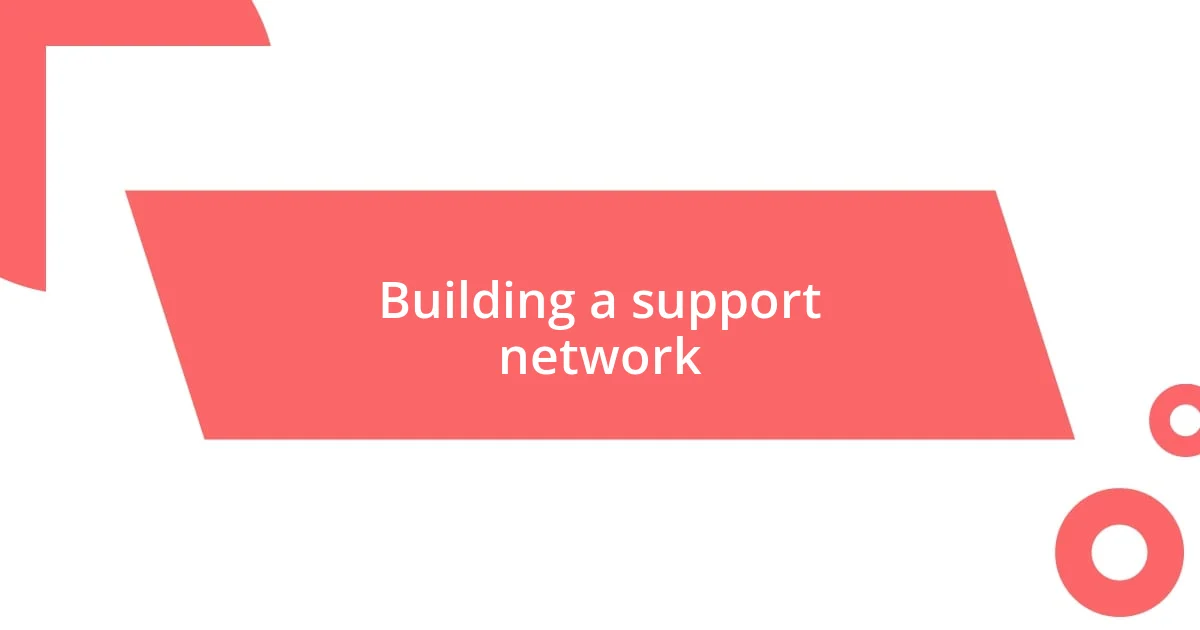
Building a support network
Building a support network is something I’ve found to be incredibly vital during challenging times. A few years ago, I was navigating a particularly tough personal crisis, and I realized that trying to go it alone was both isolating and overwhelming. I reached out to a few close friends and unexpectedly discovered that many had faced similar struggles. Their understanding and shared experiences created a comforting space where I felt heard and supported.
Forming a support network doesn’t just mean gathering friends, though. It’s about intentionally connecting with people who can provide different perspectives and skills. I remember attending a local support group where participants were encouraged to share their challenges and triumphs. Listening to others not only helped me feel less alone but also sparked ideas on how I could approach my situation differently. Isn’t it fascinating how diverse insights can broaden our thinking?
Equally important is maintaining these connections. I’ve learned that checking in with my network regularly, whether through a quick message or a coffee catch-up, helps keep the relationships strong. During a recent professional upheaval, my mentor stepped in to offer guidance based on their own experiences, reinforcing how invaluable our relationship had become over time. Think about your own connections—who could be your guiding light in a moment of need? Building a strong support network, I’ve found, is not just about the immediate relief; it’s about fostering relationships that carry you through life’s ups and downs.
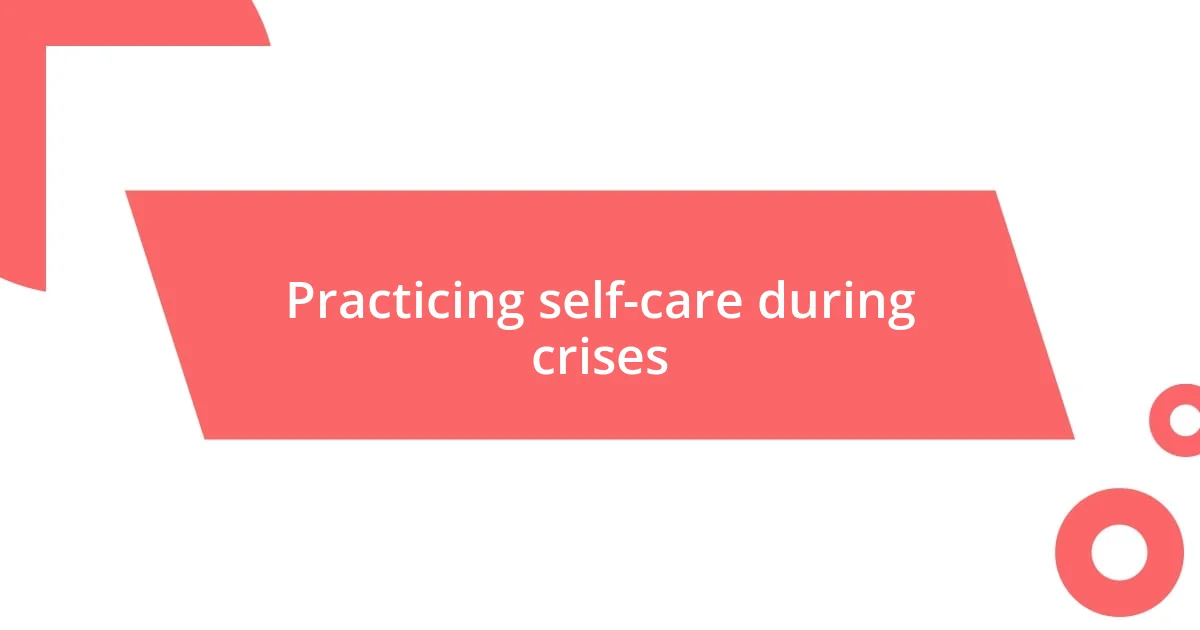
Practicing self-care during crises
Practicing self-care during crises is essential. I’ve learned that, in the thick of it, taking just a few moments for myself can reset my headspace. There was a particularly hectic period at work when deadlines piled up like a mountain. I remember stepping outside for a quick walk, letting the fresh air fill my lungs. Suddenly, everything felt less overwhelming. It was a simple act, but it allowed me to return with renewed energy and focus.
What I’ve found is that self-care isn’t selfish; it’s a necessity. During one particularly emotionally draining event, I realized the importance of my own mental health. Instead of diving right back into work after a tough meeting, I took some time to journal my feelings. Writing things down helped me process the chaos around me and gave me clarity. How often do we overlook our emotions, thinking they’ll just sort themselves out? That moment taught me that recognizing my feelings is part of taking charge in turbulent times.
Incorporating small rituals into my daily routine has made a world of difference, too. I remember how, in the midst of a crisis at home, I began practicing mindfulness for just a few minutes each morning. This practice, coupled with a warm cup of tea, became a refuge amidst the noise of uncertainty. Those moments anchored me, reminding me that even in stormy seas, I could find my calm. Have you ever thought about what little acts of self-care could serve you best? Finding those moments is like discovering a lifeline amid the chaos.
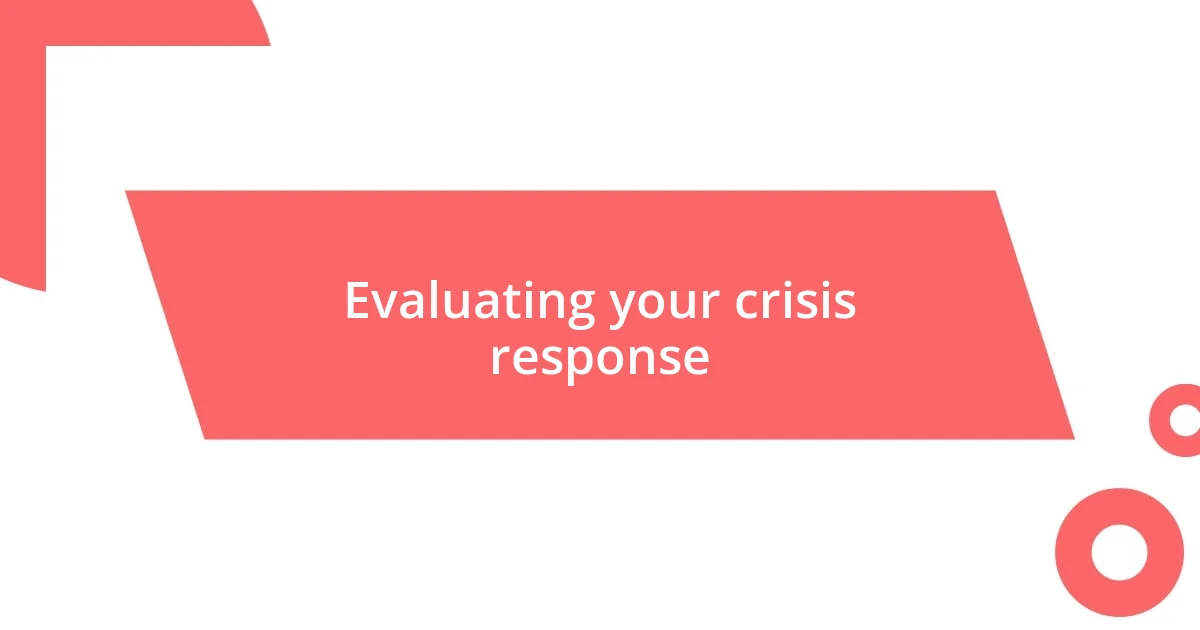
Evaluating your crisis response
Evaluating your crisis response is a crucial step in understanding what worked and what didn’t during a challenging time. I’ve found myself reflecting on past crises, analyzing my reactions, and identifying the strategies that were effective. For instance, I recall a time when I faced a sudden family emergency; I quickly established a plan of action, but what surprised me was how essential it was to stay calm and collected. That realization prompted me to consider how I could improve my response in future situations.
One insightful approach I took was to engage in self-reflection after each crisis. I dedicated time to journal about the experience, where I explored my thoughts and feelings. During a particularly stressful transition in my career, jotting down my emotions helped me pinpoint my triggers and coping mechanisms. It was enlightening to see patterns emerge, as I could then identify which strategies, like seeking advice from mentors, had genuinely helped. Have you ever paused to assess your own responses in times of stress? Doing so can provide remarkable clarity and empower you to build a toolkit for the future.
In evaluating my crisis response, I also sought feedback from those who supported me. I remember asking friends about their perception of my actions during a health scare. Their insights opened my eyes to blind spots I had overlooked and highlighted the positive impact of my connections. Engaging others in this evaluative process not only strengthens relationships but also sharpens your responses for the next time uncertainty strikes. How often do we miss out on valuable feedback in our journey towards better crisis management? Embracing this practice can significantly enhance our resilience moving forward.
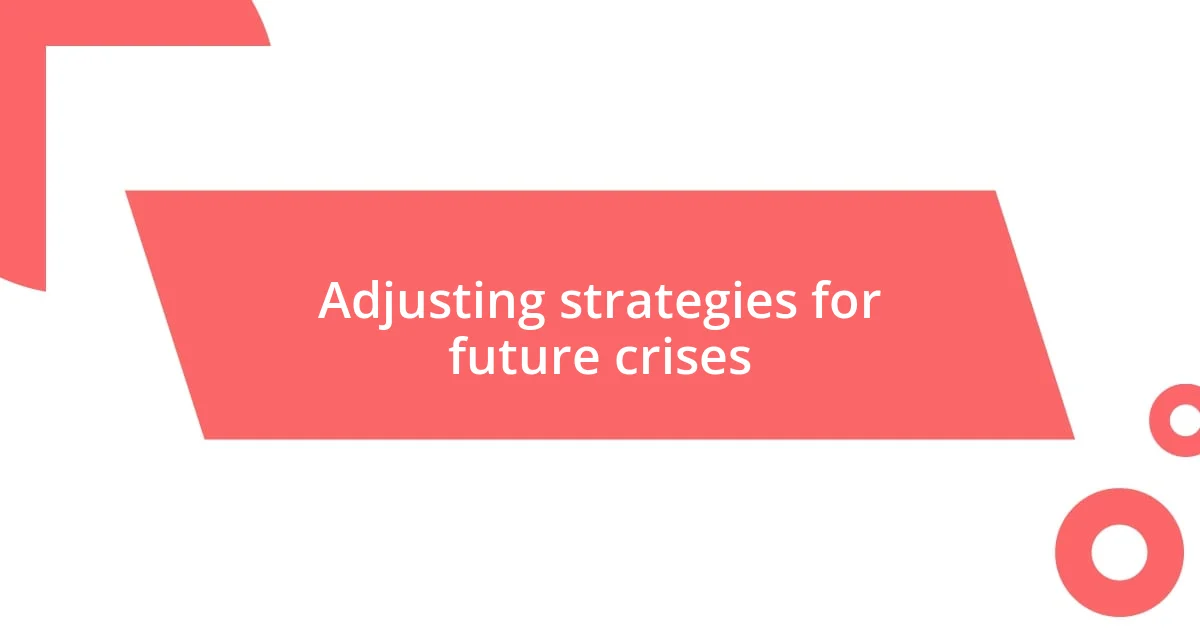
Adjusting strategies for future crises
When thinking about adjusting strategies for future crises, I often reflect on the lessons I’ve learned from previous experiences. I remember once being overwhelmed during a project deadline. Instead of sticking strictly to my original plan, I decided to reach out for help and share the workload. That small shift in approach not only lightened my stress but also fostered collaboration, which proved to be more effective. Have you considered how sharing responsibilities could transform your crisis response?
It’s fascinating how adaptability plays a key role in crisis management. During a significant personal challenge, I revisited my existing strategies and realized they weren’t serving me well. I found success by integrating flexibility into my plans, allowing me to pivot as circumstances changed. I learned that staying rigid can lead to frustration, while being open to new methods can yield surprising results. How willing are you to re-evaluate your strategies when facing uncertainty?
As I continue adjusting my crisis strategies, I find that embracing smaller changes often leads to profound improvements. For instance, in preparation for unexpected situations, I began creating backup plans—a little more effort that pays off immensely. I recall a time when I prepared a quick reference guide with essential contacts and steps to take during a stressful event, and when the moment came, it was a lifesaver. Have you ever considered how having a go-to plan could ease your mind before a crisis even begins? This proactive approach has reshaped how I face challenges, providing a sense of control I never knew I needed.

